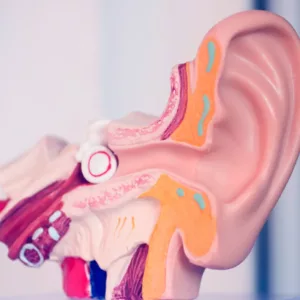Comprehensive Guide to Hearing Loss Treatment
Breaking Down the Basics: Key Components of Hearing Loss Treatment
Did you know that over 30 million U.S. adults experience hearing loss? Despite its prevalence, hearing loss often goes unnoticed, and technologies like hearing aids remain underutilized. In this guide, we’ll delve into the essentials of hearing loss treatment, shedding light on the path to improved hearing.
Understanding Hearing Loss
Hearing loss comes in various forms: conductive, sensorineural, or mixed. Indeed, the most common type among adults is age-related sensorineural hearing loss, known as presbycusis.
Learn more about what causes presbycusis.
Navigating Treatment Terrain
However, embarking on the journey of hearing loss treatment can be daunting. To simplify, let’s explore the basic components.
Diagnosis:
- Hearing Test: This vital assessment gauges your hearing thresholds, showing the type and severity of your hearing loss.
- Ear examination: Your hearing care provider uses an otoscope to check inside your ear.
Treatment Options:
- Hearing Aids: The go-to solution, these devices amplify sound, enhancing speech understanding. With various styles and technologies, they cater to individual needs and preferences.
- Assistive Listening Devices: Amplify sound in specific situations, providing support at home or in public settings.
Choosing the Right Path:
- Consider Your Needs: Factors such as the type and severity of your hearing loss, lifestyle, and budget are crucial in determining the best treatment.
- Doctor’s Recommendations: Consult your audiologist and ENT specialist for personalized guidance based on your situation.
- Trial Periods: Many providers offer trial periods, allowing you to test different devices and find the perfect fit.
Remember, finding the right treatment for hearing loss is a journey. Be patient, ask questions, and explore your options, working closely with your healthcare team to rediscover the vibrant symphony of sound.
The Role of Hearing Specialists: Experts in Guiding Hearing Loss Treatment
Hearing care specialists possess unique expertise in comprehending hearing loss, diagnosing conditions, and managing auditory disorders. Their specialized focus allows them to provide comprehensive hearing loss treatment to individuals of all ages. Through diagnostic evaluations, they create personalized treatment plans tailored to your specific hearing needs.
Tinnitus Management
Hearing specialists address hearing loss and assist in managing conditions like tinnitus. If you experience buzzing or ringing in your ears, specialists offer sound therapy and stress reduction techniques and recommend hearing aids with tinnitus masking features for a more comfortable experience.
Providing Treatments
Your audiologist leads your treatment plan, offering tailored solutions such as hearing protection, hearing aids, or assistive listening devices. With options like behind-the-ear (BTE), in-the-ear (ITE), or in-the-canal (ITC) devices, they ensure an optimal listening experience tailored to your ear and hearing profile. They also act as audio engineers, adjusting settings for seamless integration into your daily life.
Comfort and Care
Therefore, they go beyond providing personalized fitting and adjustments, ensuring optimal comfort, preventing feedback, and guaranteeing long-lasting satisfaction with your hearing devices. Understanding the emotional rollercoaster of hearing loss, specialists offer empathetic guidance, patiently answer your questions, and celebrate your progress along the journey.
Partners in Progress
Acknowledging that hearing loss is a lifelong journey, hearing care specialists stand as trusted partners. They offer ongoing adjustments, troubleshooting assistance, and adapt your treatment plan to meet evolving needs. Additionally, they extend their role as advocates, connecting you with additional resources, support groups, and specialists. This ensures you have access to everything necessary for a fulfilling life with hearing loss.

Understanding Treatment for Sensorineural Hearing Loss
Sensorineural Hearing Loss (SNHL) arises from inner ear issues, also termed nerve-related hearing loss. Furthermore, it can feel like a maze but fear not – let’s find the treatment options together.
Causes of Sensorineural Hearing Loss
So SNHL can result from various factors, including exposure to loud noise, aging (presbycusis), head trauma, viruses, autoimmune inner ear disease, heredity, malformation of the inner ear, Ménière’s disease, otosclerosis, and tumors.
Treatment for Sensorineural Hearing Loss
Actually, treatment for sensorineural hearing loss can depend on the cause of the loss.
- Irreversible Sensorineural Hearing Loss: Managed with hearing aids. It can result from age-related hearing loss or medical treatments not working effectively.
- Sudden Sensorineural Hearing Loss (SSHL): A medical emergency that doctors treat with corticosteroids in cases presumed to be of viral origin.
- Cochlea Hair Cell Swelling and Inflammation: Corticosteroids may reduce swelling and inflammation after exposure to loud noise.
- Autoimmune Inner Ear Disease: Managed medically with long-term corticosteroids and sometimes drug therapy.
- Ménière’s Disease: Medical management with a low-sodium diet, diuretics, and corticosteroids. Doctors may consider surgical procedures if vertigo is uncontrolled.
- Central Nervous System Diseases: Responds to medical management specific to the disease affecting the nervous system.
Choosing the Right Path
Consider your needs, follow your doctor’s recommendations, and utilize trial periods to find the perfect treatment. Obviously, it’s a personalized journey – be patient, ask questions, and work closely with your healthcare team for the solution that brings back the vibrant symphony of sound.
Find out more about hearing aids and hearing loss research.
Navigating the Treatment of Hearing Loss: Conductive Loss
Conductive hearing loss stemming from ear canal, eardrum, or middle ear issues provides a more straightforward path to restored sound. Let’s explore the causes, treatments, and navigational tools you need for this specific type of hearing loss.
Causes of Conductive Hearing Loss
Conductive hearing loss stems from physical barriers impeding sound transmission. Common culprits include earwax buildup, fluid in the middle ear, a perforated eardrum, or malfunctioning middle ear bones.
Treatments for Conductive Hearing Loss
Earwax removal: Removes impacted ear wax from infections or medications.
Surgery: Corrects congenital absence of the ear canal, ear canal malformations, dysfunction of middle ear structures, and otosclerosis.
Amplification: Utilizes bone-conduction hearing aids, surgical or conventional, depending on the hearing nerve’s status.
Medications: Antibiotics or antifungal medications treat chronic ear infections or middle ear fluid. Tumors usually require surgical intervention.
Unlike sensorineural hearing loss, conductive loss often promises complete restoration. Confidently chart a course towards a clearer, richer soundscape with a proper diagnosis, targeted treatment, and dedicated support.
Discover more about earwax removal.
Mixed Hearing Loss: Treatment of Hearing Loss
Dealing with mixed hearing loss can be challenging, but the good news is that effective treatments exist, addressing both conductive and sensorineural components. Let’s dive into the breakdown of potential therapies and strategies to navigate this complex hearing condition:
Treating the Conductive Component
- Addressing Blockages: Earwax removal, otolaryngoscopy, or surgery may be employed to eliminate wax buildup, fluid, or foreign objects causing conductive loss.
- Repairing Structural Issues: Surgical procedures like tympanoplasty or ossiculoplasty can address damaged ear bones or perforated eardrums.
Treating the Sensorineural Component
- Hearing Aids: Common for sensorineural hearing loss, modern hearing aids can customize amplification, enhancing speech clarity and reducing muffled sounds.
- Cochlear Implants: In cases of severe sensorineural loss, cochlear implants bypass damaged hair cells, directly stimulating the auditory nerve for restored sound perception.
Combining Treatments
In cases of mixed hearing loss, addressing the conductive component is often the initial step. Subsequently, a discussion with your healthcare provider may lead to considering hearing aids or other additional treatments for the remaining sensorineural component.

Preserving Hearing Health: Preventive Measures in the Treatment of Hearing Loss
While addressing existing hearing loss is crucial, proactive prevention is the ultimate defense against the silent thief of sound. So explore these valuable tools to safeguard your hearing health:
- Volume Control: Follow the 60/60 rule for headphone and speaker volumes – listen at 60% for no more than 60 minutes daily.
- Hearing Protection: Use earplugs or earmuffs in noisy environments and maintain distance from loud sources.
- Balanced Diet: Nourish your body and ears with antioxidants through fruits, vegetables, and whole grains.
- Regular Exercise: Aim for 150 minutes of moderate-intensity weekly exercise to improve blood circulation.
- Stress Management: Practice relaxation techniques like yoga and meditation to mitigate the impact of chronic stress.
- Regular Checkups: Schedule routine hearing exams for early detection and prompt intervention.
- Medication Management: Be aware of the ototoxic effects of certain medications; discuss alternatives with your doctor.
- Treat Underlying Conditions: Manage conditions like diabetes and high blood pressure contributing to hearing loss.
- Tobacco Cessation: Nicotine in tobacco products damages inner ear hair cells; quit smoking to preserve hearing health.
Consequently, embrace prevention to reduce the risk of hearing loss and enjoy the sounds of life for years to come.

A Roadmap for the Treatment of Hearing Loss
As we conclude our guide to hearing loss treatment, remember that your journey to optimal hearing health is within reach. By incorporating proactive measures and understanding the diverse treatment options, you can navigate the complexities of hearing loss.
We stand ready to be your partners on this journey. In fact, our expert team provides solutions just for you. Don’t let hearing loss diminish life’s vibrant noise – embrace a sound future with American Hearing + Audiology.
Contact American Hearing + Audiology today for comprehensive hearing loss testing and expert treatment. Our caring team is here to guide you, so you can rediscover the joy of clear sound. Embrace a sound future – your hearing health matters! Contact American Hearing + Audiology for an appointment at one of our top-rated hearing centers.



